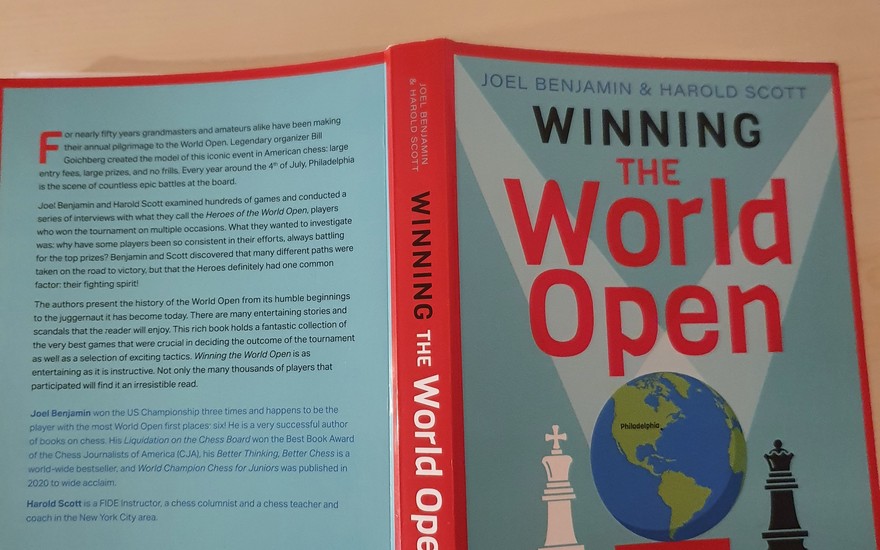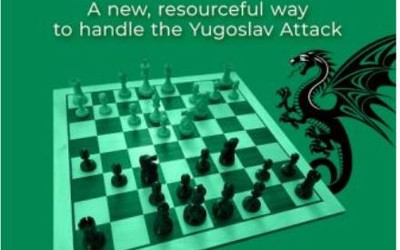
Review: Winning the World Open by Joel Benjamin and Harold Scott
This is a review by FM James Vigus of Joel Benjamin and Harold Scott's Winning the World OpenWinning the World Open
by Joel Benjamin and Harold Scott
New in Chess 2021, 344 pages
Sample pages available on the publisher's website.
The inaugural World Open tournament in Philadelphia began took place in 1973, the year after Fischer became world champion. Bill Goichberg, the founding organiser, has tirelessly kept the event going ever since. Having introduced Goichberg himself, this book focuses on the players who have won this long, gruelling, highly competitive tournament during the past (almost) half century.
This original topic was thought up by the trainer Harold Scott and enthusiastically embraced by GM Joel Benjamin, an experienced author who also holds the record of six World Open first places. The co-authors have discussed the project in an interview on Ben Johnson's Perpetual Chess podcast.
The contents with page numbers are as follows:
6 Explanation of symbols
7 Acknowledgments
9 Preface
10 Introduction
13 Chapter 1 The History of the World Open
21 Chapter 2 1973-1979 - The Early Years
32 Chapter 3 Walter Browne
45 Chapter 4 John Fedorowicz
58 Chapter 5 1980-1989 - The Decadent Decade
73 Chapter 6 Larry Christiansen
82 Chapter 7 Dmitry Gurevich
91 Chapter 8 Joel Benjamin
111 Chapter 9 Nick De Firmian
120 Chapter 10 1990-1999 - The Fall of the Iron Curtain
139 Chapter 11 Alex Yermolinsky
158 Chapter 12 Gregory Kaidanov
168 Chapter 13 Alexander Goldin
180 Chapter 14 Alexander Shabalov
196 Chapter 15 2000-2009 - The New Millennium
210 Chapter 16 Gata Kamsky
220 Chapter 17 Varuzhan Akobian
232 Chapter 18 Leonid Yudasin
239 Chapter 19 Hikaru Nakamura
252 Chapter 20 2010-2019 - The Modern Era
262 Chapter 21 Ilya Smirin
273 Chapter 22 Illya Nyzhnyk
285 Chapter 23 2020-2021 - The Covid Years
295 Chapter 24 Cheating in Chess
315 Chapter 25 Tactics Fireworks
321 Chapter 26 Tactics Answers
329 Chapter 27 World Open Champions [tables of winners]
335 Chapter 28 Trivia Quiz
337 Index of names
343 Bibliography
The authors conducted interviews with several of the players named above. Scott begins each player-chapter with an account of the career and personality, partly based on the interview. Benjamin then takes over and annotates the games. 190 games are included in total, a few of them given unannotated within Scott's decade-survey chapters.
All this is pleasantly nostalgic for players of my generation, as well as a fine record of achievements that might otherwise tend to be forgotten. Benjamin is a concise annotator who rarely gets carried away with long variations, yet offers many instructive insights. At times the authors suggest that their purpose is instructional. Playing through grandmaster games can never do any harm, and various tips on thriving in the tough conditions of a large open appear in passing. However, tuition seems to me a secondary aspect of the book.
The selection of material appears a little arbitrary in some respects. Jaan Ehlvest won five World Opens but hasn't merited a chapter; Gregory Kaidanov won one, and is featured. The longish chapter on cheating didn't grip me as much as the rest. A bit of editing down could have been useful elsewhere, too, especially at the start (did the authors really need to thank each other?). These are quibbles, however, and the authors have covered much ground in a generally entertaining fashion.
There are some memorable pen-portraits. Benjamin reminisces about Walter Browne's time-trouble addiction: 'Browne in time pressure was a sight to behold, full of moving parts. His hands would move around, as if ready to dart out with a move at any moment. His lips would purse, and occasionally he would even make clucking noises. Most of the time he made it work. But imagine if digital clocks and time delay had been around for most of Browne's effective years... He might well have picked up a few more [than 3] World Open titles.' (p. 44)
I was also intrigued by the comments on Dmitry Gurevich's emotional ups-and-downs. Alex Yermolinsky's perfectionism stands out, too: he annotates a combinative win for this book against an opponent rated just 2000, whom he could presumably have beaten with minimal expenditure of energy, berating himself for a miscalculation in quite a deep variation. Other anecdotal highlights include David Norwood's drunken victory (I'll leave the reader to discover that one).
Benjamin is candid about people he dislikes: GM Eduard Gufeld and Gata Kamsky's father are not spared. Benjamin describes other figures more warmly - especially Yermolinsky, the king of the 90s.
So much for the past - what about the present? Benjamin doesn't rule out further titles for the veteran Ilia Smirin. Illya Nyzhnyk is a very impressive player who may add to his collection of four wins - and Hans Niemann has burst onto the scene with victory in 2021. The absence of female players in the book is striking: maybe that will change?
Since this is neither a fully instructional work nor a history of a world championship, I suspect Winning the World Open won't be a bestseller. But those who acquire it certainly won't regret it.
More blog posts by Minckwitz

Review: The Perfect Pirc-Modern by Viktor Moskalenko
This is a review by FM James Vigus of Moskalenko's The Perfect Pirc-Modern
Review: Some instructional and training works
Review by FM James Vigus of recent training/calculation books
Review: Basman's Folly (1 g4) by Lakdawala and Hansen
Review by FM James Vigus of Lakdawala & Hansen's book on the Grob